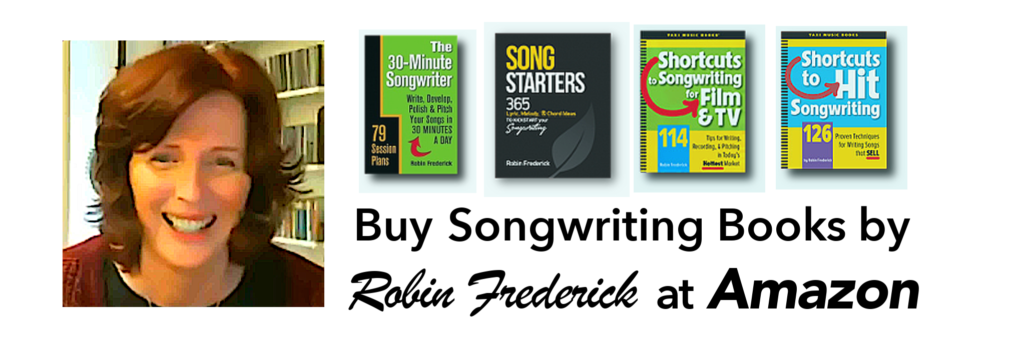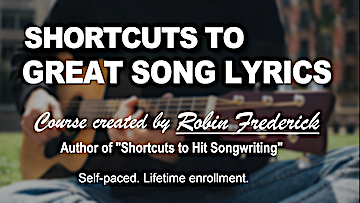I’m always curious about how other songwriters approach their craft. Maybe they’ve got some clever tricks I could use. Or maybe I’d just like to be reassured that we all do things basically the same way, that I’m not out on some weird, lonely trail all by myself.
So a while ago, I started asking other songwriters the question: “When do you write songs?” I got a wide range of answers—some expected, some not.
The “happy accident” approach
The largest number of songwriters said something like “I write when I feel inspired.” No surprise there. When an idea hits you that’s obviously a good time to write.
When a lyric or melody line suddenly comes to you, get it down right away. If you’re not near your keyboard or guitar, record a vocal version of your idea on your smartphone. Rough out a verse and chorus, filling in the lines you don’t have yet with nonsense syllables.
If there’s a tempo or groove that comes with it, clap or count it out on your recording. The more you can grab at the moment of inspiration the better off you’ll be.
The “Do it when I can…” style
Many songwriters said they try to write at least one day per week. Pro songwriters write more often than that, usually every day. Even if you don’t have gobs of time to spend on your songs, you can do something related to your songwriting every couple of days. Here are some ideas…
- Learn the chord progression of a recent hit song.
- Listen to a few of the songs on the hit song playlists at Spotify or Apple Music.
- Notice one melody, chord, or lyric technique you could use in a song of your own. Check out my Hit Song Guides for ideas.
- Write down a few ideas for lyric lines.
- Create a song title based on a line of dialogue from a TV show.
- Hum a melody and record it. Spend a little time developing it.
Keep songwriting in the back of your mind as you go to work or school. Just that little bit of awareness is enough keep the creative switch in the ON position.
Time of day
Many creative people prefer to work late at night when things are quiet. The confidence of knowing they won’t be interrupted gives them a sense of release and encourages creative thought.
I find late nights are good for relaxing and opening up to new ideas but hard for developing them. The development and rewriting processes take a lot of energy. So, for me, mornings and afternoons are better for that.
If you have a day job, then evenings may be the only chance you have to write. If you’re having trouble making time to write. Try watching fewer TV shows. Do take-out for dinner to avoid cooking and clean up time.
Choose one or two nights per week to give yourself the gift of songwriting. Just be sure it’s not a night when your favorite show is on. The temptation may be too strong.
While doing something else
If you’ve ever gotten an idea for a song while driving your car, cleaning house, or taking a walk, you’re not alone. There are people who write whole songs this way. When your conscious mind is engaged in familiar, repetitive tasks, it allows inspiration from a deeper level to bubble up.
Keep a notebook handy or a cell phone with a voice recording app to capture these ideas. You can transfer them later into your DAW or music app to expand and complete them.
Short bursts anytime
Some songwriters are able to make use of small chunks of free time: a lunch break, a half hour before bedtime or before work or school.
I recommend songwriting in 30-minute bursts every day if you can. You’ll get a lot done without even realizing it. Here’s a link to a series of my blog posts that will show you how to be a 30-minute songwriter.
The 30-Minute Songwriting Workout
Seasons and Places
Certain seasons of the year can be inspiring. Singer-songwriter James Lee Stanley says he finds the fall and early spring are the most creative songwriting times for him. I’ve talked with others who feel that the winter months force them to fall back on their own creative resources and they get more songwriting done.
In general, a change of season seems to open up emotions and free up energy. Every season has its own beauty and emotional feel. There are summer romances, winter sorrows, and the chilly coziness of fall. Seasons have always been associated with emotions. Let them speak to you and suggest song ideas.
A change of scenery can also stimulate creative ideas. If you feel like you’re in a rut, your writing will reflect that. New or unfamiliar surroundings inspire a sense of adventure that can push you to take chances in your songwriting. And you don’t have to travel to distant, exotic places to feel the effect. A day trip to a beach or weekend in the mountains is all you need. Write while you’re there; don’t wait until you get back to your comfort zone.
Songwriters are moms and dads
Songwriters with children have to come up with creative ways to find writing time. Everyone I spoke to agreed that once the kids are old enough to be in school you can get an hour or two of focused writing in during the morning or early afternoon. But errands, friends, and phone calls can quickly eat up that time.
Try to set aside a couple mornings a week dedicated to songwriting. Schedule errands, appointments, and visits on other days. Set your phone to vibrate. Your songwriting time is valuable and in short supply so you may need to make an extra effort to protect it.
One writer lets his kids contribute ideas and phrases that he turns into songs just for them. Then he encourages them to go off and write their own songs, stories, and cartoons. It doesn’t buy him a whole lot of time but as the kids get older they have an understanding of what creative work means, and they’ll give Mom or Dad a little more space.
Writing on demand
When Academy Award-winning songwriter Sammy Cahn was asked which came first, the words or the music, he answered “Neither. The phone call.”
Cahn was referring to the fact that he wrote when he had a project, a reason to write. He waited until he had a “brief” to write for. A music brief is a short synopsis of the type of song a client is looking for: an upbeat Pop song for a TV commercial, a ballad for an established artist looking for their next hit, or an Americana song for a TV series set in the old west.
A songwriter with a successful career is one who can write on demand whether the brief is for a TV show theme song, a radio hit, a song for a friend’s wedding, or five new songs for the EP your fans are waiting for. You want to be able to sit down and write a song when you feel like it and, more importantly, when you don’t feel like it.
You can practice writing on demand by giving yourself assignments in the song market you’re interested in. If Film & TV songwriting is your goal, you can write songs to scenes in your favorite shows.
Keep a little corner of your mind dedicated to songwriting and it’ll become easier to find the right time to write. The right time could be any time!
by Robin Frederick



